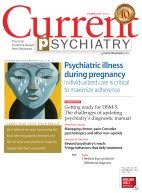Monday, June 7, 2010
Lowering Alzheimer's risk
Nazem Bassil, MD, Fellow, Division of geriatric psychiatry, St. Louis University School of Medicine, St. Louis, MO
George T. Grossberg, MD, Samuel W. Fordyce Professor, Department of neurology and psychiatry, St. Louis University School of Medicine, St. Louis, MO
Pharmacologic treatments for Alzheimer’s disease (AD) may improve symptoms but have not been shown to prevent AD onset. Primary prevention therefore remains the goal. Although preventing AD by managing risk factors such as age or genetics is beyond our control, we can do something about other factors.
This article summarizes the findings of many studies that address AD prevention and includes an online-only bibliography for readers seeking an in-depth review. The evidence does not support a firm recommendation for any specific form of primary prevention and has revealed hazards associated with estrogen therapy and nonsteroidal anti-inflammatory drugs. Most important, it suggests that you could reduce your patients’ risk of developing AD by routinely supporting their mental, physical, and social health.
Read full text (free access)
Comment on this article
Email the editor
Subscribe to:
Post Comments (Atom)


No comments:
Post a Comment